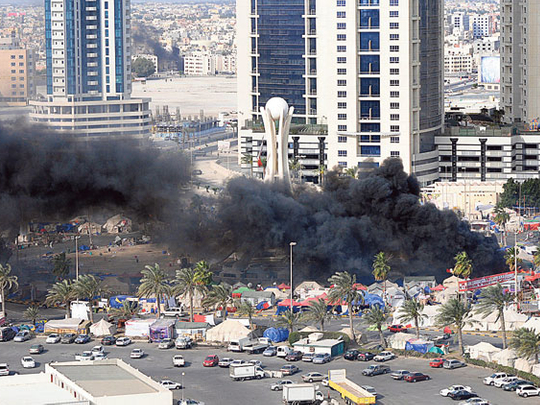
Manama: Bahrain on Wednesday imposed a 12-hour curfew alongside a key highway and banned gatherings, rallies, demonstrations and sit-ins in the country.
At least six people were killed on Wednesday as security forces cleared Pearl Roundabout, the focal point for anti-government protests.
In a communiqué read on Bahrain TV, a curfew was imposed between 4pm and 4am alongside the highway from the Saif Flyover until the traffic lights before the Shaikh Eisa Bin Salman Bridge, a stretch of about six and a half kilometres. The flyover is a few hundred metres from the Pearl Roundabout, while Shaikh Eisa bridge is one of the three links between Manama and Muharraq, the second largest city.
The highway was shut down for three days after protesters poured sand and placed blocks, bricks and pipes on it. The curfew area also includes 400 metres on either side of the highway.
Last evening, there were reports that two ministers, four Shura Council members and several judges had resigned. According to the reports, Nizar Al Baharna, the newly-appointed health minister, has decided to quit the government he joined in 2006 as state minister for foreign affairs.
Majeed Al Alawi, the former opposition figure who was given the labour portfolio in 2002 and then the housing ministry, reportedly told a local daily that he was boycotting the government "because of the way it is dealing with the events in the country."
Meanwhile, Iran said Bahrain had made a "strategic mistake" in asking Gulf troops to help quell pro-democracy protests, as President Mahmoud Ahmadinejad blamed the US for the move.
US Secretary of State Hillary Clinton also said Gulf states who sent troops to help Bahrain curb demonstrations are on the wrong track. "We find what's happening in Bahrain alarming. We think that there is no security answer to the aspirations and demands of the demonstrators," Clinton told CBS, urging Bahrain to negotiate a political agreement.
What it means
- According to Human Rights Watch, the Bahraini constitution specifies that under emergency law the government can:
- Control movement and transportation.
- Conduct inspections.
- Ban gatherings.
- Ban non-governmental organisations.
- Ban political societies.
- Ban trade unions
- Ban the publication of newspapers.
- Make arrests.
- Monitor phone calls and correspondence.












